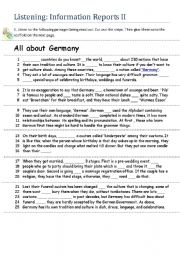
|
Information Reports II
In this worksheet, students do a listening task. The teacher reads out the information report on Germany to the class. Students fill in the blanks. The words are mainly simple verbs in the present tenses or prepositions, so it is useful for both elementary and beginning students. Then students cut and paste the information report onto the provided ...
Level: elementary
Age: 10-14
Type: worksheet
Downloads: 3
|
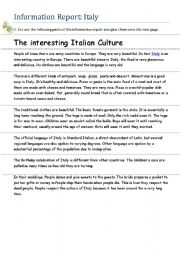
|
Information Report I
This is an information report kinaesthetic starter activity to introduce a class of elementary students to information reports. Students cut out the parts of an information report and glue them onto the next page. You can then use this as a starter point for discussion and analysis of its structure.
This is Part I. :-)
Level: elementary
Age: 10-14
Type: worksheet
Downloads: 7
|
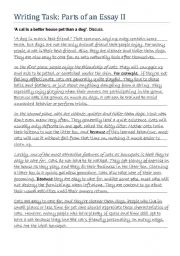
|
Writing: Parts of an Essay II
This follows on from the Parts of an Essay I. It is another essay about cats and dogs. Students are to discuss the first page. Then questions break down the essay even further. You can then make another essay if you like.
Level: advanced
Age: 12-17
Type: worksheet
Downloads: 39
|
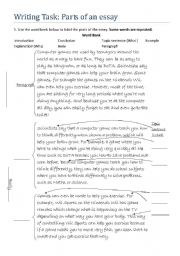
|
Writing: Parts of an Essay I
Use this to introduce students to the structure of an essay. You can then apply this to other essays given. They may use different words but they use the same structure.
Level: advanced
Age: 13-17
Type: worksheet
Downloads: 110
|
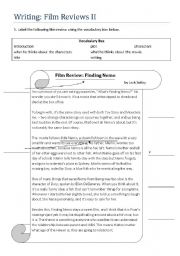
|
Writing: Film Reviews II
This worksheet is designed to go with the movie Finding Nemo. The students read a sample review and analyse it using the vocabulary box. After a discussion as to what goes in each paragraph, the students watch the movie and answer some simple movie comprehension questions. From this information, they then write their own film review using the scaff...
Level: elementary
Age: 10-14
Type: worksheet
Downloads: 72
|
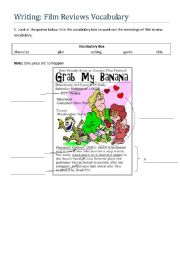
|
Film Reviews I
This is the first of two worksheets designed to step elementarty-level students through the process of writing a film review. The first step is to learn some film terminology through the mock-up film poster. (It was taken from another resource also found on here - I forgot the name of the file I took it from but thank you in advance).
The seco...
Level: elementary
Age: 10-14
Type: worksheet
Downloads: 46
|
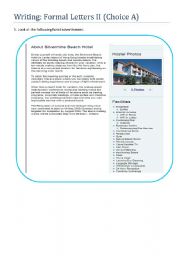
|
Writing: Formal Letters
This simple worksheet presents models of enquiry letters and letters to the editor from which the students can write their own. This is meant to be a follow-on activity after introducing formal letters.
Level: elementary
Age: 12-17
Type: worksheet
Downloads: 53
|
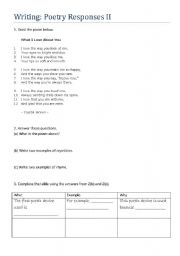
|
Writing: Poetry Responses II
This is the second worksheet that follows Writing: Poetry Responses I. Students identify poetic devices in the poems attached, and then combine them together to complete a scaffolded poetry response. Eventually, you�d want the students to write it on their own.
Level: elementary
Age: 12-17
Type: worksheet
Downloads: 8
|
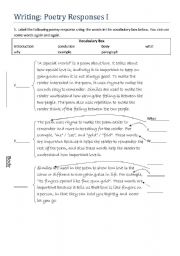
|
Writing: Poetry Responses I
Students learn the structure of a poetic response through the gap-fill vocabulary exercise. Then afterwards, students identify poetic devices and use them as a basis to complete a scaffolded poetry response.
Level: elementary
Age: 12-17
Type: worksheet
Downloads: 17
|
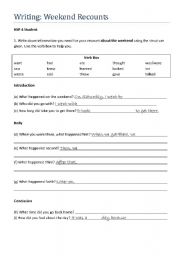
|
Writing Recounts Part III
Students use the verb box in the first part to answer the question skeletons about their weekend. They then copy the information from the questions to the second part to make a recount with an introduction, body and conclusion.
Level: elementary
Age: 10-12
Type: worksheet
Downloads: 7
|